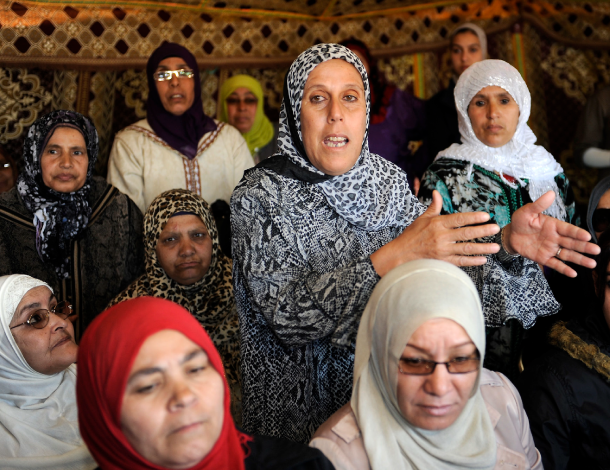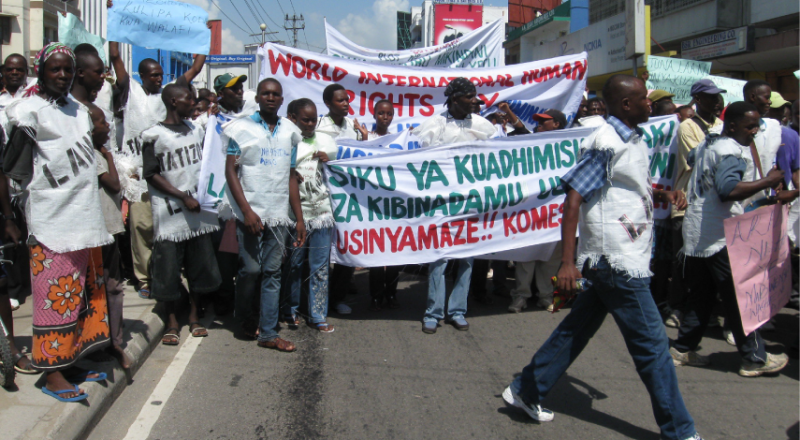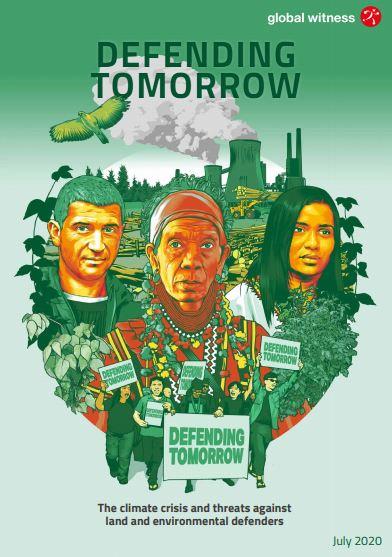
Fadila M. was a Soulaliyate tribal activist from Azrou, the Ifrane region of Morocco, a great campaigner against discrimination of the tribal women. As part of the Soulaliyate Women's Land-Use Rights Movement, she contributed to overhauling the framework legislation on the management of community property through the 2019 adoption of three sets of laws guaranteeing the equality of women and men. Fadila M. was part of the first grassroots nationwide mobilization for land rights that saw in 2012 for the first time Soulaliyate women register to benefit from compensation relating to land cession.
The movement also got the 1919 Dahir (Moroccan King's decree) amended to guarantee women the right to equality. For long, customary laws had denied women a right to benefit from the land, especially those who were single, widowed or divorced. The rights to collective land in Morocco were transmitted traditionally between male members of a family of over 16 years of age. It took the courageous work of women like Fadila M to overturn centuries of such great injustices.

In Kenya, Esther Mwikali was a well-known land rights activist from Mithini village, Murang' a County, who fought powerful businesses who abused the rights of people they claimed were squatters after acquiring the land they occupied. In this increased phenomenon of land evictions in Kenya, Mwikali was a fierce and trusted fighter in the face of the powerful tycoons. Both Fadila and Mwikali are no more.
After Mwikali didn't show up at a village meeting, for two days the community searched and on August 27, 2019, her body was found displaying signs of torture on a farm near her homestead. Local activists had no doubt her murder was related to the area's ongoing land struggles. James Mburu, the spokesperson for the 'squatters', said: "We associate Mwikali's death with land struggles around here." To date, no one has been brought to face justice for Mwikali's murder.
A year earlier in Morocco, Fadila M. had just been part of a protest march over collective land when she died on September 27, 2018. While authorities reported her death as being accidental and a cardiac arrest, the local section of the Moroccan Association of Human Rights (AMDH) pointed out that she was suffocated by a member of the police force using a Moroccan flag. Such sardonic imagery and symbolism - states suffocating women criminalized for daring to speak out about the continued debasement and discrimination. Her family requested an investigation, but the results of the autopsy were not provided.
Why being a woman land rights activist is a dangerous
The deaths of the two women, thousands of kilometres apart, one in the north and another in the east of Africa, have a multitude of commonalities. To dare be vocal about a woman's place in society and specifically women's denial of rights over land is challenging the very core of patriarchy which prizes and rewards men over women. Across Africa, land is the heart of masculinized and colonial power and control of community resources. Colonialism as a form of racial-capital- patriarchal exploitation rearranged many social relations, capital and wealth administration in most of the African countries.

While a majority of women rarely had full rights to land, colonization upset and closed doors on many ways of negotiating community wealth ownership - land included- by enforcing a rigid top-down, male privileged access and control of resources. New forms of masculinized power control were propagated and propelled while building on the existing inequalities it found in societies. This didn't only destroy communal systems of care and safety nets bringing about the phenomenon of landlessness hitherto alien in African societies, but also severely dislodged the varied forms in which women's land security was guaranteed.
Denial of land rights has been at the heart of economic marginalisation for millions of African women for centuries. And as long as this discrimination and violence has existed, women in their diverse backgrounds have fought back for their right to equal access and established feminist realities at every stage of the struggle. Therefore Fadila’s and Mwikali’s fight was a continuity, building on histories of women’s resistance to multiple marginalizations.
Besides being a violation in and of itself, lack of control over land builds harmful social norms around women's ability to make economic decisions, locking them out of decision-making fora, both in homes to the national stage, that shape economic reality. The full afront of capitalism has further complicated women's struggle for land rights. Women land activists now not only face a customary exclusionary tenure but also "commodification of land and agricultural commercialization—all of which ultimately increase land values contributing to the erosion of land rights overall, and particularly women's land rights" as noted by Hosaena Ghebru. These build on already mixed systems of land ownership, access and use ranging from communal ownership alongside state and private ownership.
Land rights activists are working against the global rush for land and extracted resources by large scale, multinational corporations aided by local ruling political elite against communities that are marginalized by these very 'investments'. Community organizers and activists like Mwikali and Fadila risked their personal and family safety because they are aware that the path of the mighty is the path of destruction.
Denial of land rights for women has been a source of constant feeling of homelessness, and actual uprooting of women from lands that patriarchy says is not theirs, despite having lived and worked that land. For women land rights activists, the land is not merely about economics, but it is also of profound cultural relevance and significance. Whoever controls the land controls history, whoever owns the land determines who is remembered and who's erased, who is accorded value, both in life and death. Land carries our histories, belief systems, connections between our ancestors and the future. By putting their lives on the line, these women's land rights activists dared to show us the path towards a feminist future.

New feminist realities, new threats
In her new book Decolonization and Afro-feminism, Prof. Sylvia Tamale emphasizes the much-needed work of eco-feminists on the continent and the link between gender oppression and disastrous environmental degradation that is ongoing.
"The new scramble for Africa, manifested in a repeat of land grabbing largely through "private investor acquisitions" for profit, is a strategy to absorb this surplus capital."
She notes that vast chunks of land in Madagascar, Uganda, Sudan, Zimbabwe, Zambia, Congo, etc., have been sold off or leased to countries such as China, South Korea, Japan, Qatar, United Arab Emirates and Saudi Arabia. In the day, most countries are signing off sustainable development goals promising to pursue justice for women, but in the night, land rights activists are disappeared and some murdered. The feminists realities pushed by women land rights activists are well within the long history of women’s relationship with nature both as conservationists and a shared threat of erasure by multiple oppressive forces like patriarchy, racism and capitalism.

The Global Witness Report 2019 into the killings of land and environmental defenders shows the highest number yet have been murdered in a single year globally with the majority being in the Global South.
In 2015, the AU Specialized Technical Committee on Agriculture and Rural Development, Water, and Environment adopted a recommendation to facilitate women's economic empowerment where states would ensure documented allocation of 30 percent of land to African Women by 2025. While laws have changed, largely because of the push back from grassroots women’s movements, with some reforms in the customary African land tenure system to treat women equally, the threat of privatization, commercialization of land introduces new challenges for women even for those that only recently started to enjoy equal rights. Ecological justice remains an uphill struggle simply because of the multiple interlocking and mutually reinforcing powers from social norms, state and big business that constantly threaten women's rights over land.
Protect women's voices from being silenced
Throughout history against oppression, those on the frontline always know that the struggle might take their lives. For a body that persistently refuses to be invisibilized, refuses to be at the very least passive in the face of oppression, is stolen, just like the land. But this doesn't mean we valourize losing life to the struggle. Mwikali and Fadila fought side by side with their communities, a fight against erasure and disenfranchisement, of the present and future generations. As communities continue to face this enormous pressure after their land, new systems of protection especially of the community leaders are essential. Challenging the politically and economically powerful requires support for collective community strategies for women activists fighting for the greater economic, cultural and spiritual communal survival and sustenance.
